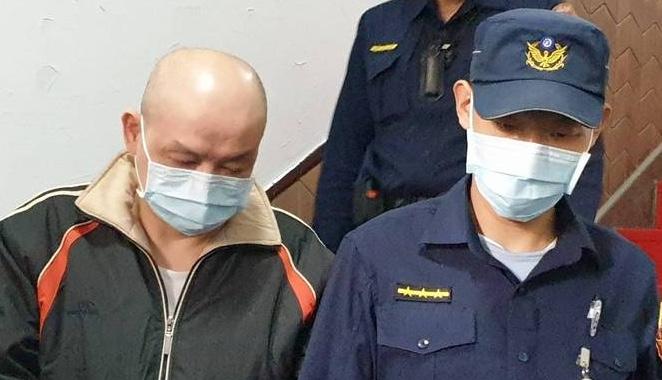The Supreme Court dismissed the appeal of death-row inmate Chen Yi-lung (陳憶隆), who was sentenced in 2000 for the 1995 kidnapping and murder of businessman Huang Chun-shu (黃春樹).
Chen and accomplice Huang Chun-chi (黃春棋) have waited 25 years for execution, the longest of all 36 inmates currently on death row.
The two were sentenced to death in 2000 for kidnapping Shang for a ransom of NT$70 million (US$2.29 million at the current exchange rate) and murdering him.

Photo: Yang Kuo-wen, Taipei Times
They were sentenced under a now-defunct Criminal Code provision promulgated in 1999 that called for a “mandatory death penalty.”
However, a landmark ruling by the Constitutional Court on Sept. 20 last year stated that the death penalty could only be applied to the “most serious” premeditated murders or premeditated crimes resulting in death.
Constitutional Judgement No. 8 left the 37 prisoners — now 36 — on death row able to appeal following an extraordinary appeal filed by the prosecutor-general.
The Supreme Prosecutors’ Office last year agreed to file extraordinary appeals for Chen and Huang, citing the unconstitutionality of the original ruling.
Chen then submitted a retrial request to the High Court in June, citing the constitutional judgement as new evidence and seeking to determine whether his crimes met the requirements for the “most serious” of crimes.
However, the High Court ruled that the constitutional judgement allowed death-row inmates to ask the prosecutor-general to file an extraordinary appeal, but did not justify a retrial.
Chen's petition was based on a misunderstanding of the law and therefore did not meet the requirements for reopening the case, the court said.
Chen then appealed to the Supreme Court, which found no error in the High Court ruling and dismissed the appeal, finalizing his death sentence.

The inspection equipment and data transmission system for new robotic dogs that Taipei is planning to use for sidewalk patrols were developed by a Taiwanese company, the city’s New Construction Office said today, dismissing concerns that the China-made robots could pose a security risk. The city is bringing in smart robotic dogs to help with sidewalk inspections, Taipei Deputy Mayor Lee Ssu-chuan (李四川) said on Facebook. Equipped with a panoramic surveillance system, the robots would be able to automatically flag problems and easily navigate narrow sidewalks, making inspections faster and more accurate, Lee said. By collecting more accurate data, they would help Taipei

STATS: Taiwan’s average life expectancy of 80.77 years was lower than that of Japan, Singapore and South Korea, but higher than in China, Malaysia and Indonesia Taiwan’s average life expectancy last year increased to 80.77 years, but was still not back to its pre-COVID-19 pandemic peak of 81.32 years in 2020, the Ministry of the Interior said yesterday. The average life expectancy last year increased the 0.54 years from 2023, the ministry said in a statement. For men and women, the average life expectancy last year was 77.42 years and 84.30 years respectively, up 0.48 years and 0.56 years from the previous year. Taiwan’s average life expectancy peaked at 81.32 years in 2020, as the nation was relatively unaffected by the pandemic that year. The metric

TAKING STOCK: The USMC is rebuilding a once-abandoned airfield in Palau to support large-scale ground operations as China’s missile range grows, Naval News reported The US Marine Corps (USMC) is considering new sites for stockpiling equipment in the West Pacific to harden military supply chains and enhance mobility across the Indo-Pacific region, US-based Naval News reported on Saturday. The proposed sites in Palau — one of Taiwan’s diplomatic allies — and Australia would enable a “rapid standup of stored equipment within a year” of the program’s approval, the report said, citing documents published by the USMC last month. In Palau, the service is rebuilding a formerly abandoned World War II-era airfield and establishing ancillary structures to support large-scale ground operations “as China’s missile range and magazine

Passengers on Taiwan High Speed Rail (THSR) will be required to use headphones and make phone calls in gangways under new “quiet travel” rules starting Sept. 22. THSR Chairman Shih Che (史哲) told media that THSR will run a three-month promotional campaign to ensure widespread adoption of the new rules. Those repeatedly ignoring the guidance face the potential termination of their transport contract, which can result in them getting escorted off the train, according to THSR. Shih shared his hope to cultivate an environment conducive to rest and reading for the train’s passengers, stating that these changes aim to “promote self-discipline” among passengers